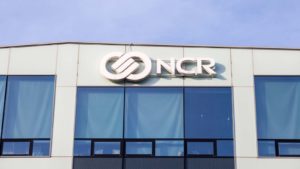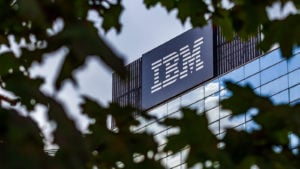At the end of December, Bloomberg reported that almost $17 billion in software-related distressed debt was trading significantly below 100 cents on the dollar. This suggests that 2024 could be the year to sell overly leveraged software stocks.
The report suggested that software companies in this predicament might turn to private credit to get themselves out of a jam. Tim Donahue, global head of Lazard Capital Solutions, stated:
“The market should see more private credit financing where there is real enterprise value but the company is saddled with a capital structure and terms that do not currently work… Private credit can be the elixir for companies.”
According to Finviz.com, there are 152 software stocks with a market capitalization of $2 billion or more trading on a U.S. exchange. My goal is to find three software stocks to sell with balance sheets that are overly leveraged.
NCR Voyix (VYX)

NCR Voyix (NYSE:VYX) changed its name from NCR Corp. on Oct. 16, 2023, as part of NCR’s separation into two businesses.
NCR Voyix specializes in point-of-sale software for retail stores, restaurants, and digital banking industries. The second business, NCR Atleos (NYSE:NATL), provides an end-to-end ATM management solution. It has one of the largest ATM networks in the world.
As of Q3 2023, NCR Voyix had net debt of $7.18 billion, 3.1x its current market capitalization of $2.34 billion. However, that includes $2.02 billion from Atleos. Excluding this debt, its net debt of $5.16 billion was 2.2x its market cap, still exceptionally high.
Its Altman Z-Score, which indicates the likelihood of a company going bankrupt within 24 months, is 1.01. Anything below 1.81 suggests the odds are high it will enter bankruptcy proceedings in the next two years.
The seven analysts that cover VYX are exceptionally bullish about its chances as an independent company, separate from NCR Atleos—five rate it a Buy with a $19 target price. Based on the analyst’s 2024 earnings per share estimate of $2.54, it trades at just 6.6x those earnings.
While it might seem like a value play, the current interest rates on its debt range from a low of 5.0% to a high of 7.65%, this is not a software stock for risk-averse investors.
Gen Digital (GEN)

Gen Digital (NASDAQ:GEN) is the not-so-new name of Norton LifeLock, the cybersecurity company that changed its name in November 2022. Its brands include Norton, Avast, Lifelock, AVG, etc.
The company’s net debt is $8.93 billion, 62% of its $14.4 billion market cap. While not nearly as high as NCR Voyix, its interest expense through the first six months of fiscal 2024 was $343 million. On an annualized basis, its $686 million in interest payments is approximately 89% of its GAAP operating profit. If not for income tax benefits from restructuring, it would be difficult to make a GAAP profit in 2024.
Gen Digital reported positive Q2 2024 results in November, including a 27% increase in revenue to $948 million and a 41% increase in non-GAAP operating income. However, its customer count fell by 100,000 year-over-year to 38.5 million.
You’ll notice in the company’s Q2 2024 results that it had $347 million for litigation costs in the second quarter. That’s for an October 2023 judgment against the company for willful patent infringement. The judge ordered the company to pay more than $481 million in damages to Columbia University.
Do you want to own stock in a heavily indebted company that willfully infringed on patents and then allegedly made false statements to hide the facts? While the company’s appealing the decision, I’d avoid this one until it gets its debt in line.
Kyndryl Holdings (KD)

Kyndryl Holdings (NYSE:KD) was spun off from IBM (NYSE:IBM) on Nov. 3, 2021. IMB shareholders received one KD share for every 5 IBM shares.
Kyndryl provides managed infrastructure services for other companies. It operates six tech units, including applications, data and AI; core enterprise and zCloud, IBM’s mainframe-as-a-service offering; digital workplace; network and edge; security and resiliency; and cloud.
IBM spun off the company to make it more profitable while allowing Kendryl to seek new revenue streams and potential profits.
In the latest quarter ended Sept. 30, 2023, its revenues were $4.07 billion, 3% lower than a year earlier, with a net loss of $142 million. The good news is that the loss was half what it was in Q2 2023.
However, it finished the second quarter with a net debt of $2.77 billion, or 62% of its $4.5 billion market cap. Unlike Gen Digital, its obligations come with reasonable interest rates between 2.05% and 6.55%. Approximately 83% of its debt matures in 2026 or later.
Despite the better interest rates on its debt, it has an Altman Z-Score of 1.42, which puts it in distressed territory and it could face bankruptcy within the next 24 months.
You can do better.
On the date of publication, Will Ashworth did not have (either directly or indirectly) any positions in the securities mentioned in this article. The opinions expressed in this article are those of the writer, subject to the InvestorPlace.com Publishing Guidelines.
